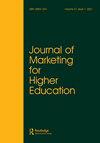The role of affective ties in the asymmetrical relationship between student satisfaction and loyalty. Comparative study of European business schools
IF 2.1
3区 管理学
Q3 BUSINESS
引用次数: 0
Abstract
ABSTRACTIn the context of an increasingly competitive environment in higher education, this article looks at the determinants of student satisfaction in European business schools. We analysed one French and one Georgian business school through a survey of 551 students. Structural equation modelling was used to test the research hypotheses, with qualitative data analysis further explaining the findings. The results identify the determinants of student satisfaction and confirm a positive and significant influence of student satisfaction on their loyalty. However, the findings reveal an asymmetrical relationship between the two constructs and suggest that, in addition to a high level of satisfaction, affective ties need to be ensured between HEIs and their students to generate loyalty. The study contributes to the literature by emphasising the importance of customer satisfaction in a service industry from an affective standpoint through the lens of customer expectations. It also demonstrates the importance of dissatisfier elements, especially when it comes to examining loyalty. The results are of vital importance for business school management to develop strategies aimed at attracting and retaining students, which will in turn improve financial performance and successful positioning.KEYWORDS: Service qualitystudent satisfactionloyaltyHEdPERFNLPbusiness schoolaffective ties Disclosure statementNo potential conflict of interest was reported by the author(s).Notes1 39 out of 41 HEdPERF variables were retained for the study. Quality of health service and student residences were not included as they had no link with the cases concerned.2 Probably due to limitations in building this factor using the HEdPERF tool. See Appendix 2.情感纽带在学生满意与忠诚的不对称关系中的作用。欧洲商学院比较研究
摘要:在高等教育竞争日益激烈的背景下,本文着眼于欧洲商学院学生满意度的决定因素。我们通过对551名学生的调查,对一所法国商学院和一所格鲁吉亚商学院进行了分析。结构方程模型用于检验研究假设,并通过定性数据分析进一步解释研究结果。结果确定了学生满意度的决定因素,并证实了学生满意度对其忠诚度的积极和显著影响。然而,研究结果揭示了这两种结构之间的不对称关系,并表明,除了高水平的满意度外,还需要确保高等教育机构与学生之间的情感联系,以产生忠诚度。该研究通过从客户期望的角度强调了客户满意度在服务行业中的重要性,从而为文献做出了贡献。这也证明了不满意因素的重要性,尤其是在检验忠诚度的时候。研究结果对商学院管理层制定旨在吸引和留住学生的战略至关重要,这反过来将改善财务业绩和成功定位。关键词:服务质量;学生满意度;忠诚度;商学院情感关系;披露声明作者未报告潜在的利益冲突。注1 41个HEdPERF变量中有39个被保留用于本研究。卫生服务质量和学生宿舍不包括在内,因为它们与所涉及的病例没有联系可能是由于使用HEdPERF工具构建此因子的限制。见附录2。
本文章由计算机程序翻译,如有差异,请以英文原文为准。
求助全文
约1分钟内获得全文
求助全文
来源期刊
CiteScore
7.80
自引率
42.40%
发文量
37
期刊介绍:
The Journal of Marketing for Higher Education is a well-established, double-blind peer reviewed, international journal that publishes original research and review articles. It has been publishing articles on higher education marketing since 1988 and is international in outlook with a readership and papers from across the world. The Journal of Marketing for Higher Education is a multi-disciplinary journal and welcomes papers from all the major disciplines that connect with the marketing of higher education.

 求助内容:
求助内容: 应助结果提醒方式:
应助结果提醒方式:


